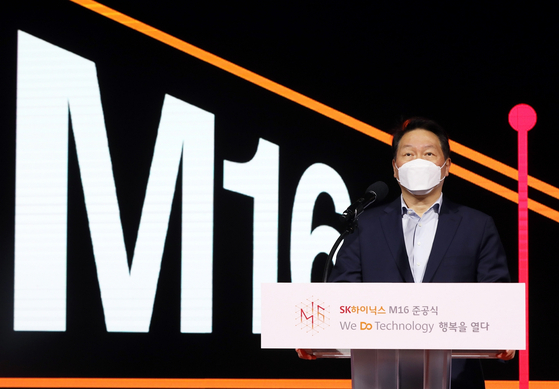
SK Group Chairman Choi Tae-won gives a greeting at the M16 completion ceremony held at SK Hynix headquarters in Icheon, Gyeonggi on the 1st. On this day, Chairman Choi said, “I will return the salary received from SK Hynix to the members.” [사진 SK하이닉스]
SK Telecom’s labor and management have agreed to improve the incentive standard from next year. The controversy over performance pay for large corporations that sparked at SK Hynix at the end of last month seems to be ending in about 10 days.
However, some experts point out that the’Korean-style performance compensation system’, which pays incentives as wages, should be reorganized into individual evaluations in order not to recur.
SKtel labor-management agreement for “improving performance-based pay standards”
On the 9th, the labor and management of SK Telecom, which was in conflict over the scale of incentive pay, came up with an agreement. In the morning of this day, SK Telecom said, “The labor-management agreed to create a predictable and transparent incentive system together.” Announced.
The labor and management of this company: ▶Design a separate standard with the union to replace economic value added (EVA) ▶Dramatically improve the payment method to increase the proportion of employees who receive more than the standard amount ▶Effort to restore the pride of members through wage negotiations Agreed to do.
Earlier, through the labor-management council on the 4th, SK Hynix agreed to change the standard for calculating incentives from EVA to link operating profits from next year. Separately, the treasury stock payment equivalent to 200% of the basic salary and 3 million welfare points will be paid this year. Last year, when the incentives were announced as 20% of the annual salary, the company suffered a lot of anger by asking the union to “disclose the calculation standards.”
The controversy also shifted to Samsung. On the 8th, the unions of the eight affiliates of the Samsung Group, including Samsung Electronics, issued a joint request stating that “the method of calculating performance pay needs to be transparent and seek to change the payment standard.” At LG Electronics, which is scheduled to announce the scale of incentives during this month, there is an atmosphere of increasing tension. Last year, the company recorded a record-high operating profit of 3.19 trillion won.
![The controversy over SK Telecom's incentive pay was settled by a labor-management agreement. The picture is Jeong-ho Park, president of SK Telecom. [사진 SK텔레콤]](https://i0.wp.com/pds.joins.com/news/component/htmlphoto_mmdata/202102/09/c998fdae-2c2a-49e4-b0b3-2fec2895fc41.jpg?w=560&ssl=1)
The controversy over SK Telecom’s incentive pay was settled by a labor-management agreement. The picture is Jeong-ho Park, president of SK Telecom. [사진 SK텔레콤]
“League of their own” vs “Stop it now”
Regarding the controversy over the incentive pay, some dismissed it as “a league of their own that took place in a big company that makes good money.” In fact, the aviation, travel, and hotel industries that were hit by Corona 19 are being pushed to the edge of the cliff with honorary retirement following the freezing and reduction of annual salaries. As the conflict over performance pay, centered on major conglomerates, was revealed without filtering, it was a reaction of “selfish rice bowl fight” and “relative deprivation”.
The business community recognizes the controversy over the performance pay as “a signal that a new standard for performance pay centered on fairness is needed.” In fact, in the in-house union bulletin board or the anonymous community app’Blind’, “the key is not to ask for more incentives, but to fix the system.” The article aimed at “don’t be driven by dissatisfaction” is getting sympathy.
“Korean incentive pay should be introduced for wages…individual evaluation”
Some point out that it is time to change the Korean-style performance compensation system, which pays incentives for each company and division. Like foreign companies, wage and incentive standards should be set for each individual from the hiring stage, and performance evaluation should be performed individually.
In fact, major global companies have a different incentive structure than domestic companies. It is divided into RSU (Restricted Stock Unit), which is a performance compensation system that pays stocks as compensation when a company achieves its goals in a specific period, and stock options that give employees the right to buy company stocks at a specific price. Usually, incentives are not paid in bulk to the department, and it varies from person to person. For example, when paying a salary, they negotiate RSU or stock options together.
“In Korea, incentives are applied collectively to all members according to company performance,” said Sung Tae-yoon, professor of economics at Yonsei University. “It should be converted to a structure in which incentives are applied according to individual evaluations of company members.” said.
Reporters Park Hyung-su and Choi Hyun-ju [email protected]
